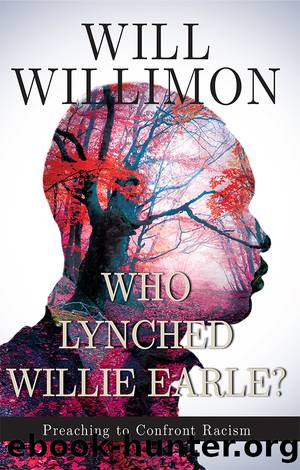Who Lynched Willie Earle? by Willimon William H.;

Author:Willimon, William H.;
Language: eng
Format: epub
Publisher: Abingdon Press
Published: 2017-01-04T00:00:00+00:00
Only then are we are free to tell the truth of our captivity: âAll have sinned and fall short of Godâs gloryâ (Rom 3:23), and âThere is no righteous person, not even oneâ (Rom 3:10).
What white congregations need is not blame but recognition, honest admission. William Stringfellow told white social activists that if they wanted to do something âpracticalâ to work the reconciliation of the races they could âweep. First, care enough to weep.â42 As Jeremiah demonstrated to Israel, the first prophetic move is tears. People in power put a happy face on present arrangements and extol Incarnation as a sign that God is pleased as punch with us, just as we are.
Christians are free not to be happy with the status quo. In weeping and godly sorrow, we let go of our tight, defensive grip on the present and begin to dream a new future.
Martin Luther King, in writing to the good, white liberals of Birmingham, noted that early Christians gladly suffered for their beliefs and their witness disturbed people in power. Today the church is a flaccid voice, a defender of the establishment and preserver of the status quo. Sadly, the power structure of Birmingham is consoled rather than disturbed by the church.43
In lament for our history in white and black we show that we are taking the first steps to fulfilling Paulâs injunction: âDonât be conformed to the patterns of this world, but be transformed by the renewing of your minds so that you can figure out what Godâs will isâwhat is good and pleasing and matureâ (Rom 12:2).
In reading this book you join with me in lament, then move beyond tears to transformation and obedience to Godâs will. All this is from God, leading to lives that do not contradict God, allowing ourselves to be loved by the one who first loved us.
In an Advent sermon on Matthew 1:1-17, Drew Martin confessed the sin of his family in South Carolina as a call to confession in his small-town South Carolina congregation:
Whether or not my ancestors were in fact racist was not [a thought] that I had ever seriously pondered. I claimed that they were not racist without even thinking about it. I grew up in a very inter-racial school district and took it for granted that racism was wrong. My great-great Grandfather fought for the Confederacy. . . . I had always been proud of this, because my family was proud of it, and I never thought about a potential conflict with my modern views on the topic of race.44
Martin relates how a conversation with an African American colleague (a woman who dared to question his assertion that âmy family wasnât racistâ) forced him âto reflect . . . there is no indication that my family was ever involved in the abolition movement or the civil rights movement, [therefore] the likelihood is that at least by todayâs standards they were racist. I donât know whether any of my family ever owned slaves, but if they didnât most likely it was because as far as I can tell no one in my family has ever had any money.
Download
This site does not store any files on its server. We only index and link to content provided by other sites. Please contact the content providers to delete copyright contents if any and email us, we'll remove relevant links or contents immediately.
| Anthropology | Archaeology |
| Philosophy | Politics & Government |
| Social Sciences | Sociology |
| Women's Studies |
Nudge - Improving Decisions about Health, Wealth, and Happiness by Thaler Sunstein(7709)
The Fire Next Time by James Baldwin(5447)
iGen by Jean M. Twenge(5417)
Adulting by Kelly Williams Brown(4576)
The Sports Rules Book by Human Kinetics(4388)
The Hacking of the American Mind by Robert H. Lustig(4383)
The Ethical Slut by Janet W. Hardy(4258)
Captivate by Vanessa Van Edwards(3840)
Mummy Knew by Lisa James(3693)
In a Sunburned Country by Bill Bryson(3543)
The Worm at the Core by Sheldon Solomon(3487)
Ants Among Elephants by Sujatha Gidla(3467)
The 48 laws of power by Robert Greene & Joost Elffers(3293)
Suicide: A Study in Sociology by Emile Durkheim(3024)
The Slow Fix: Solve Problems, Work Smarter, and Live Better In a World Addicted to Speed by Carl Honore(3010)
The Tipping Point by Malcolm Gladwell(2926)
Humans of New York by Brandon Stanton(2873)
Get What's Yours for Medicare: Maximize Your Coverage, Minimize Your Costs by Philip Moeller(2741)
Handbook of Forensic Sociology and Psychology by Stephen J. Morewitz & Mark L. Goldstein(2705)
